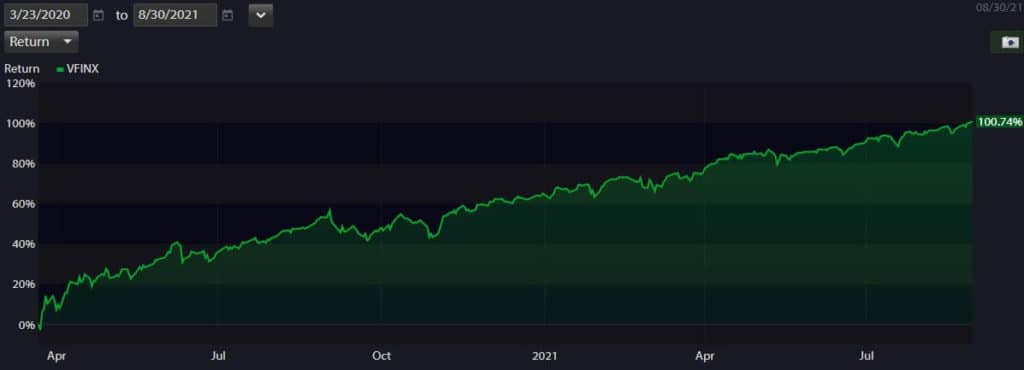After hitting “rock bottom” following global shutdowns related to the coronavirus in March 2020, the S&P 500 has roared ever since delivering a 100% return. You read that right: 100%.
SIDEBAR: Someone out there is highlighting this past 18 month window in their investing masterclass, illustrating that in times of financial crisis, the best action for your portfolio is inaction. Don’t sell. Be patient. Ride it out. But we digress…
What now?
After living through the shortest bear market in history, we’re now witnessing company valuations being pushed to new heights only surpassed by the dot-com bubble of the late 1990s. While this may sound unsettling, also consider that with interest rates so low, it would be equally worrying if equities weren’t expensive (reason: low interest rate yields push investors to equities).
So, at this juncture and with cash to invest, should you a) lean towards low interest fixed income that’s not (or barely) keeping up with inflation, or b) buy potentially overvalued equities? Pick your poison.
From our vantage point, choosing low interest debt or expensive equities is not an either/or proposition – everything comes back to diversification. Instead of chasing returns, we prefer the approach of aligning portfolio decisions to your unique life: your upcoming cash needs (and/or life transitions), your tax bracket, and your tolerance + ability to take risk.
While we’re not ones for reading the tea leaves, we did appreciate reviewing the latest JP Morgan Long-Term Capital Market Assumptions report. In it, they had a stark quote that stuck out:
“The price for dealing with the pandemic today comes at the cost of tomorrow’s returns in many conventional asset markets.”
Not exactly a glass half-full outlook for the road ahead.
The biggest challenges outlined by the report included:
- Whether governments/business can rise to the climate challenge
- Increased sovereign debt balances and an expectation for fiscal stimulus to continue
- Stagnating globalization, companies shortening their supply chains
- Era of US “exceptionalism” possibly coming to an end, leading to a weaker dollar
While we certainly believe that all challenges present opportunities, we feel equally strong that investors should prepare for muted annual returns over the next decade. We touched on this topic not long ago.
According to the same JP Morgan LTCMA report, over the next 10-15 years, inflation is anticipated to flatten at an overall rate of 2.0%. This is a tough pill to swallow when the same report projects compound return rates for the same period to be 1.10% for cash, 1.50% for intermediate Treasuries, and 2.50% for US investment grade corporate bonds.
For equities, the LTCMA report outlined the following predictions for the next 10-15 year investment time horizon:
- 4.10% for US Large Cap
- 4.60% for US Small Cap
- 6.20% for US Value
- 6.50% for US REITS
- 5.20% for Euro equities
- 6.10% for UK equities
- 5.10% for Japanese equities
- 6.80% for emerging market equity
Compare these expected returns to the 10% average annual return that the stock market has delivered over the last century. Not ideal.
Instead of guessing which asset class will perform best, or searching for the next Amazon to invest in, legendary investor and founder of Vanguard, John Bogle (who’s 3-fund “boring” portfolio outperformed the largest endowments in 2020, yet again), said it best:
“Don’t look for the needle in the haystack. Just buy the haystack.”
As evidence-based investors, we wholeheartedly agree with this approach.






